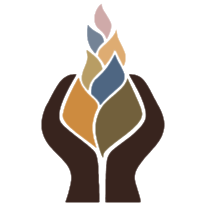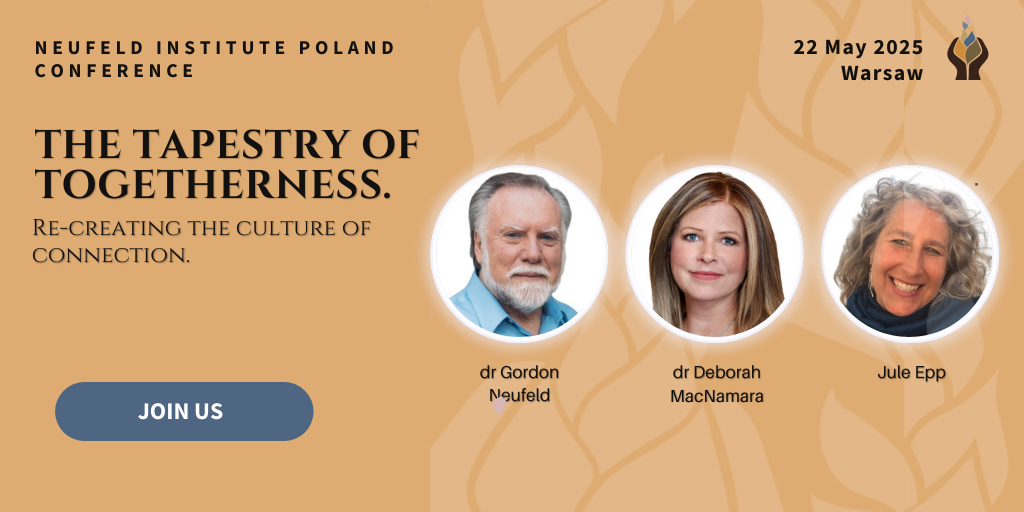Neufeld Institute Poland
is honoured to invite you to a unique conference dedicated to rebuilding connection and community. In a world full of challenges and rapidly changing social realities, we increasingly feel the need to establish and nurture deep interpersonal relationships. The conference will bring together experts in developmental psychology and attachment theory to share their knowledge and experiences of creating
and nurturing relationships.
The special guest of the conference is Gordon Neufeld, a long-time lecturer in the Department of Psychology at the University of British Columbia, who has developed a coherent and comprehensive theoretical model of human development.
Joining us to share their wisdom and experiences are exceptional speakers:
- Tamara Neufeld Strijack, clinical psychologist and Dean of the Neufeld Institute,
- Jule Epp, psychologist and educator,
- Joanna Bylinka, psychologist, parenting consultant, and Regional Director of Neufeld Institute Poland.
During the conference, we will also celebrate the launch of Deborah MacNamara’s new book, Nourished (Polish title: Nasyceni). This is a rare opportunity to meet three renowned authors connected with the Neufeld Institute and the publishing house „Szum Lasu”: Gordon Neufeld, Tamara Neufeld Strijack, and Deborah MacNamara. A special autograph session will be held, where attendees can have their books signed by the authors.
The conference will be hosted by Maciej Miecznikowski.
We warmly welcome:
- Specialists working with children and families (teachers, therapists, doctors, and other caregiving and supportive professions),
- Parents,
- School administrators,
- Researchers.
Why Attend the Conference?
This is a unique opportunity to delve into the subject of human connections through the lens of distinguished experts. You will learn how to restore and nurture relationships that form the foundation of healthy emotional development for both children and adults. It’s also a chance to exchange experiences and build new connections with like-minded individuals who share your interests and passions.
Join us, and together let’s create a world that is welcoming and supportive for both children and adults!
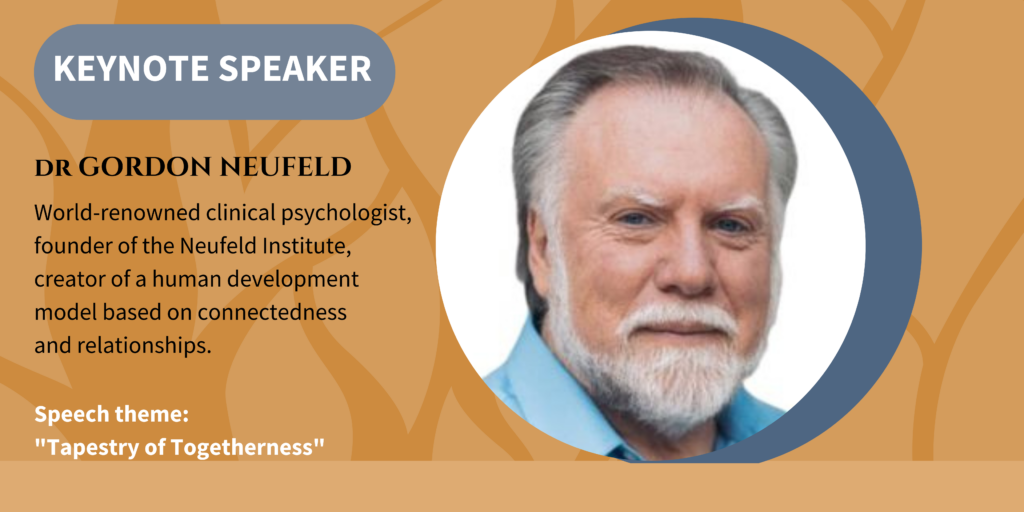

The conference programme
We yearn for togetherness – every cell in our body, every fibre in our being, every neuron in our brain. But why togetherness? Why not survival or well-being? Because togetherness turns out to be our best bet for survival and wellbeing. And even if this vulnerable experience of togetherness has been too much for us, with plenty of wounds – at our core we are still creatures of attachment. Early in our evolutionary history, our mammalian brain figured this out. Now this wisdom is etched into the deepest recesses of the brain’s animating centres, carried forward into today’s world on each newborn’s legs, eagerly anticipating its fulfillment. The problem is that the primordial cultures that originally informed this evolutionary wisdom are now largely inaccessible if not extinct. As a result, this primordial drive for togetherness becomes thwarted, rendering us the most alarmed and frustrated humans to ever have walked this world. Most mental health issues can be traced to these roots. Most parenting these days could be seen as battling against the symptoms of this untenable scenario. So wherein lies the answer? It is certainly not in the direction of fighting primordial instincts and emotions or the behaviour that results from them. The way forward is to paradoxically go back to our beginnings, recreating micro-cultures that can dance with the human brain. If we and our children are to truly thrive, we will need to recreate the rituals of togetherness that our brains were built for. Included in this presentation will be an introduction to the five basic types of connecting rituals foundational to recreating a tapestry of togetherness.
How is attachment nurtured? What comes between our love and how we show up for our children? Sometimes the gap between how we want to show up and our actual actions seems too big. Despite our best intentions we see how our caring is not coming through to our children. Is it possible that we are unknowingly sabotaging our connection with our children? Could it be that we need to start from the basics and reclaim our caring? We will explore how engaging our body, understanding our nervous system defaults and connecting to bodily sensations can open us to feelings and growing our capacity to feel deeply. By feeling deeply we will be able to occupy our caretaker role sovereignly and answer our childrens’ attachment needs.
Caring for someone through food is one of the oldest dances of connection. The tragedy is that we have shifted our attention to food as the nourishing factor instead of the relationships and emotions that are supposed to infuse it. Food serves us best when it serves relationship but we have to make sense of the disconnection first before fixing it. Reclaiming nourishment is not only critical for our kids in becoming eaters but is the most consistent representation of our attachment to each other. Where there are food problems there is a recipe for relational ones, and where they are attachment issues there are also likely food ones too. We will delve into why ‘how we eat’ was always meant to come before considering ‘what we eat.’ Based on her new book Nourished: Connection, food, and caring for our kids (and everyone else we love), Deborah will focus on food as a medium for enacting relationship and caring emotion with our loved ones.
Some words hurt, others heal. A certain word to one person may cause some consternation, if not anger, while to another person it may bring joy or a sense of appreciation and understanding. What does it depend on? And how does it happen that words – even though we cannot even touch them – can touch us to the core? Speech is of great importance in a child’s development and ability for closeness. While this is not where the history of attachment begins, it is certainly words that gave and still give us, day after day, the chance to build deep, stable and safe bonds. Those that build roots, but also give wings. Words can be a refuge that bring to us certainty in this uncertain world where we are always and inevitably accompanied by separation. Where is this source of power in words and how can we harness it so that it can reinforce our relationships? What words would the tapestry of our everyday life have to consist of and when should they be uttered so that we and our loved ones are protected and have conditions conducive for development?
We all need connection. We all need help to navigate around the vulnerability that attachment brings with it. Our neurodivergent children, with their heightened sensitivity, need this help all the more urgently. And yet, so often, our “usual” ways of trying to lower defenses and establish connection fail with these, our most vulnerable children. All parents experience frustration when their attempts at attaching to their child are thwarted. It is therefore no surprise that parents of neurodivergent children experience this frustration to an extreme extent, along with feelings of rejection, desperation, helplessness. It is important for all of us to understand this emotional reaction to a sense of separation from our children if we want to prevent a defensive “hardening” of our own hearts and a further sabotaging of our dance of attachment with them. Ultimately, it will be our own journey of tears that will clear the way towards being able to fine-tune our attachment rituals to the needs of our individual child. When we find our way to our own vulnerability, we will find our way to our children, no matter what defenses may stand in the way.
How did we end up so alone when it comes to caring for our children? With fractures in our cultural roots, so many of us are lacking the support needed for our children to thrive. In our fragmented societies, care has become monetized and role-based, rather than relational based. We have become blind to what is needed for optimal development and emotional health, but we can’t afford to wait until society realizes what has gone wrong. The impetus falls on us to re-create a culture of connection, built from the bottom up with attachment at the core. We will explore what it might look like to take the lead and re-gather a supporting cast — for the sake of our children and ourselves.
Speakers
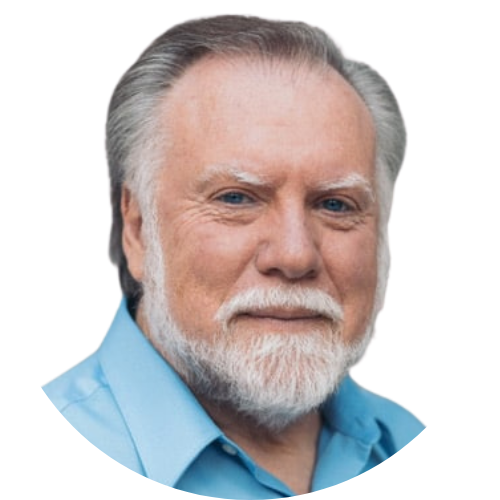

A world-renowned clinical psychologist and founder of the Neufeld Institute, Dr. Gordon Neufeld was teaching at the Faculty of Psychology at the University of British Columbia. He has developed a coherent and comprehensive model of human development, focusing on the importance of attachment and relationships in the upbringing and developmental process.


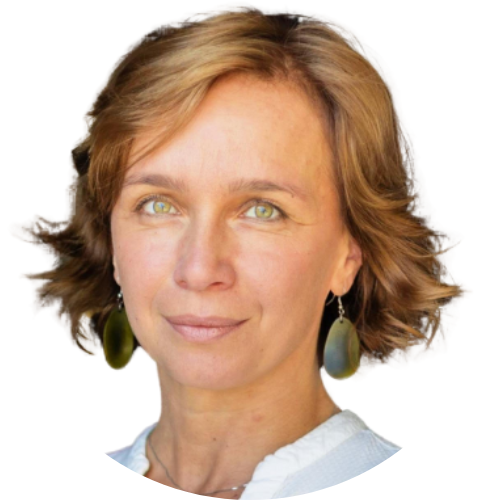

Urska Zugelij – A psychologist in the final stages of training in body psychotherapy, she earned her PhD at the University of Ljubljana in Slovenia. Currently, she leads developmental psychology and teaches courses on attachment at the University of Maribor (Slovenia). At the Neufeld Institute, she serves as the language director for Slovenian, Croatian, Bosnian, and Serbian languages.


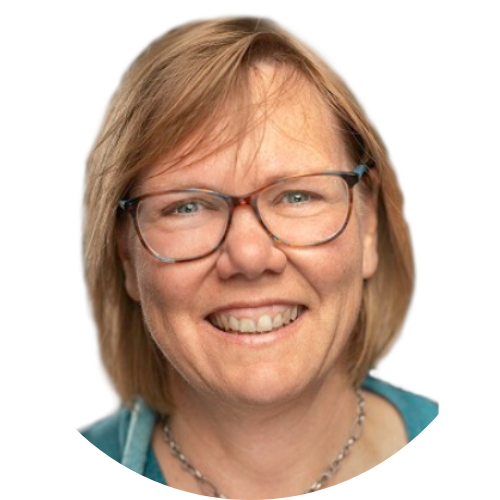



Conference presenter:


Organisation details
Date:
22 May 2025
Duration:
9:00 – 19:00
Address: to be announced soon 🙂
Lectures will be held in English with simultaneous translation into Polish.
Join the conference participants
Ticket Prices – Offline Event Participation:
Early Birds Tickets – 499 PLN
Sales available until January 31, 2025.Regular Tickets – 599 PLN
Sales available from February 1, 2025, to March 31, 2025.Final Call Tickets – 699 PLN
Sales available from April 1, 2025, until tickets are sold out.
Ticket Prices – Online Participation:
Early Birds Tickets – 349 PLN
Sales available until January 31, 2025.Regular Tickets – 449 PLN
Sales available from February 1, 2025, to March 31, 2025.Final Call Tickets – 549 PLN
Sales available from April 1, 2025, until tickets are sold out.
All ticket types include access to the conference recording for one month.
Register today!
Organiser
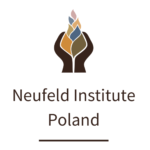

Partners of the conference








